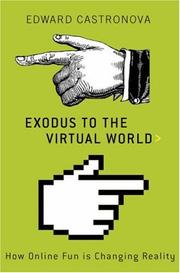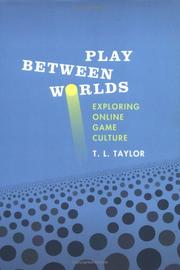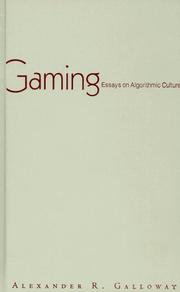| Listing 1 - 10 of 30 | << page >> |
Sort by
|
Book
ISBN: 2869068700 2869067720 9782869067721 Year: 2021 Publisher: Tours: Presses universitaires François-Rabelais,
Abstract | Keywords | Export | Availability | Bookmark
 Loading...
Loading...Choose an application
- Reference Manager
- EndNote
- RefWorks (Direct export to RefWorks)
"À la maison ou dans les transports, au bureau ou aux toilettes, les jeux vidéo sont partout. La banalisation de ce loisir électronique dans toutes les tranches d’âge et toutes les catégories de la société s’est accompagnée d’une diversification des publics mais aussi des manières de jouer. Loin de l’image caricaturale du mâle adolescent jouant des heures durant à des jeux de tir, désormais les jeux vidéo sont pour beaucoup une activité ordinaire qui trouve place dans les interstices, les temps libres des routines journalières ou hebdomadaires. Ils sont imbriqués dans les modes de vie et contribuent aux modes d’habiter. Fruit d’un travail de recherche collectif, ce livre analyse la place de ces pratiques vidéoludiques au quotidien. Comment joue-t-on aux jeux vidéo aujourd’hui? Qui joue, où, et avec qui ? Quelles sont les diverses pratiques, de sociabilité, d’échanges mais aussi de mobilités et de marquage de l’espace, qui se développent autour de ce loisir électronique ? Quelles sont les émotions, les expériences, les affects, que les jeux vidéo rendent possible ? Cette exploration inédite du domaine des jeux vidéo étudie la diversité de leurs publics, les pratiques que ces derniers développent, et les expériences qui s’y éprouvent."
Video games - Social aspects --- Computer games - Social aspects --- Video gamers. --- Computer games --- Social aspects --- Sociology --- jeu vidéo --- pratique ludique --- game studies --- play studies --- quotidien --- numérique --- habiter --- Video games --- Social aspects.

ISBN: 1403984123 9781403984128 Year: 2007 Publisher: New York: Palgrave MacMillan,
Abstract | Keywords | Export | Availability | Bookmark
 Loading...
Loading...Choose an application
- Reference Manager
- EndNote
- RefWorks (Direct export to RefWorks)
Virtual worlds have exploded out of online game culture and now capture the attention of millions of ordinary people: husbands, wives, fathers, mothers, workers, retirees. Devoting dozens of hours each week to massively multiplayer virtual reality environments (like 'World of Warcraft 'and 'Second Life'), these millions are the start of an exodus into the refuge of fantasy, where they experience life under a new social, political, and economic order built around 'fun'. Given the choice between a fantasy world and the real world, how many of us would choose reality? 'Exodus to the Virtual World' explains the growing migration into virtual reality, and how it will change the way we live--both in fantasy worlds and in the real one.
Civilization, Modern --- Fantasy games --- Internet games --- Virtual reality --- Forecasting --- Social aspects. --- Internet games - Social aspects --- Virtual reality - Social aspects --- Fantasy games - Social aspects --- Civilization, Modern - 21st century - Forecasting --- Video games --- Social aspects

ISBN: 1282100890 9786612100895 0262284715 1423774574 9780262284714 9781423774570 0262201631 9780262201636 9780262512626 9781282100893 6612100893 0262512629 Year: 2006 Publisher: Cambridge (Mass.): MIT Press,
Abstract | Keywords | Export | Availability | Bookmark
 Loading...
Loading...Choose an application
- Reference Manager
- EndNote
- RefWorks (Direct export to RefWorks)
"In Play Between Worlds, T.L. Taylor examines multiplayer gaming life as it is lived on the borders, in the gaps - as players slip in and out of complex social networks that cross online and offline space. Taylor questions the common assumption that playing computer games is an isolating and alienating activity indulged in by solitary teenage boys. Massively multiplayer online games (MMOGs), in which thousands of players participate in a virtual game world in real time, are in fact actively designed for sociability. Games like the popular EverQuest, she argues, are fundamentally social spaces."--Jacket.
Internet games --- Fantasy games --- Role playing --- Social aspects. --- Role enactment --- Role-taking ability --- Roleplaying --- Fantasy role playing games --- Role-playing games --- Social role --- Acting games --- Games --- Electronic games --- GAME STUDIES/Online Games --- GAME STUDIES/Games & Culture --- CULTURAL STUDIES/Identity Politics --- Social aspects --- Internet games - Social aspects --- Fantasy games - Social aspects --- Role playing - Social aspects --- Computer games --- Television games --- Videogames --- Video games
Book
ISBN: 9789089646392 9089646396 9789048523030 9048523036 Year: 2015 Volume: *1 Publisher: Amsterdam Amsterdam University Press
Abstract | Keywords | Export | Availability | Bookmark
 Loading...
Loading...Choose an application
- Reference Manager
- EndNote
- RefWorks (Direct export to RefWorks)
In Playful Identities, eighteen scholars examine the increasing role of digital media technologies in identity construction through play. Going beyond computer games, this interdisciplinary collection argues that present-day play and games are not only appropriate metaphors for capturing postmodern human identities, but are in fact the means by which people create their identity. From discussions of World of Warcraft and Foursquare to digital cartographies, the combined essays form a groundbreaking volume that features the most recent insights in play and game studies, media research, and identity studies.
Social Media --- Médias sociaux --- Médias --- Computer games. --- Video games -- Psychological aspects. --- Video games -- Social aspects. --- Computer games --- Video games --- Social Sciences --- Recreation & Sports --- Social aspects --- Psychological aspects --- #SBIB:309H103 --- #SBIB:309H040 --- #SBIB:309H17 --- 316.37 --- Application software --- Electronic games --- Social aspects. --- Psychological aspects. --- Mediatechnologie / ICT / digitale media: sociale en culturele aspecten --- Populaire cultuur algemeen --- Computer- en videogames --- Identiteit. Individu en maatschappij. Persoonlijkheid --- 316.37 Identiteit. Individu en maatschappij. Persoonlijkheid --- Computer games - Social aspects --- Computer games - Psychological aspects --- Video games - Social aspects --- Video games - Psychological aspects --- Internet games --- Television games --- Videogames --- Games --- digital media --- play --- huizinga --- identity --- homo ludens --- history --- European history --- Casual game --- Foursquare City Guide --- Mobile phone --- Video games.

ISBN: 9780816648504 9780816648511 0816648506 0816648514 Year: 2006 Volume: 18 Publisher: Minneapolis (Minn.): University of Minnesota press,
Abstract | Keywords | Export | Availability | Bookmark
 Loading...
Loading...Choose an application
- Reference Manager
- EndNote
- RefWorks (Direct export to RefWorks)
Computer. Automation --- Sociology of culture --- Video games --- Social aspects --- Philosophy --- 82:62 --- Literatuur en technologie --- 82:62 Literatuur en technologie --- Television games --- Videogames --- Electronic games --- Social aspects. --- Philosophy. --- Video games - Social aspects --- Video games - Philosophy --- Computer games --- Internet games --- Games
Book
ISBN: 9781498513074 1498513077 9781498513081 9781498513098 1498513093 1498513085 Year: 2016 Publisher: Lanham, Maryland : Lexington Books,
Abstract | Keywords | Export | Availability | Bookmark
 Loading...
Loading...Choose an application
- Reference Manager
- EndNote
- RefWorks (Direct export to RefWorks)
How Video Games Impact Players provides a balanced and nuanced look at the complex role that video games play in society by analyzing the positive and negative effects of game rules, feedback, and self-presentation.
Video games --- Social aspects. --- Telecommunication technology --- Philosophy and psychology of culture --- Sociology of culture --- Computer. Automation --- Mass communications --- Social aspects --- Jeu vidéo --- --Jeu virtuel --- --Social aspects --- Video games - Social aspects --- Jeu virtuel
Book
ISBN: 9789088904363 9789088904370 9789088904387 9088904375 9088904383 9088904367 Year: 2017 Publisher: Leiden: Sidestone Press,
Abstract | Keywords | Export | Availability | Bookmark
 Loading...
Loading...Choose an application
- Reference Manager
- EndNote
- RefWorks (Direct export to RefWorks)
"The Interactive Past brings together a diverse group of thinkers--including archaeologists, heritage scholars, game creators, conservators and more--who explore the interface of video games and the past in a series of unique and engaging writings. They address such topics as how thinking about and creating games can inform on archaeological method and theory, how to leverage games for the communication of powerful and positive narratives, how games can be studied archaeologically and the challenges they present in terms of conservation, and why the deaths of virtual Romans and the treatment of video game chickens matters. The book also includes a crowd-sourced chapter in the form of a question-chain-game, written by the Kickstarter backers whose donations made this book possible. Together, these exciting and enlightening examples provide a convincing case for how interactive play can power the experience of the past and vice versa."--Page [4] of cover.
Telecommunication technology --- Archeology --- Archaeology --- Virtual reality in archaeology --- Video games --- Interactive multimedia --- Computer games --- Social aspects --- Social aspects. --- Video games. --- Television games --- Videogames --- Electronic games --- Virtual reality in archaeology. --- Archaeology. --- Computer games. --- Archaeology - Computer games --- Video games - Social aspects --- Interactive multimedia - Social aspects. --- Internet games --- Games

ISBN: 2222035279 9782222035275 Year: 1984 Publisher: Paris: CNRS,
Abstract | Keywords | Export | Availability | Bookmark
 Loading...
Loading...Choose an application
- Reference Manager
- EndNote
- RefWorks (Direct export to RefWorks)
Games --- -Games --- -Rome --- -Children --- Children's games --- Games, Primitive --- Games for children --- Pastimes --- Primitive games --- Recreations --- Entertaining --- Physical education and training --- Amusements --- Play --- Sports --- Social aspects --- -Social life and customs --- Recreation --- Children --- Games, Greek and Roman --- Rome --- Social life and customs. --- Social life and customs --- Jeux grecs et romains --- Games - Rome --- Games - Social aspects - Rome --- Rome - Social life and customs

ISBN: 2707127868 9782707127860 Year: 1998 Publisher: Paris: La Découverte,
Abstract | Keywords | Export | Availability | Bookmark
 Loading...
Loading...Choose an application
- Reference Manager
- EndNote
- RefWorks (Direct export to RefWorks)
Video games --- Jeux vidéo --- Jeux video --- Videospelen --- Ordinateurs et enfants --- 82:3 --- 82:659.3 --- 82:62 --- 82:62 Literatuur en technologie --- Literatuur en technologie --- 82:659.3 Literatuur en massacommunicatie --- Literatuur en massacommunicatie --- 82:3 Literatuur en maatschappijwetenschappen --- Literatuur en maatschappijwetenschappen --- Social aspects --- Jeux électroniques. --- Ordinateurs et enfants. --- Jeux vidéo. --- Logiciels. --- Video games - Social aspects
Book
ISBN: 1501338455 9781501338458 9781501375446 9781501338472 9781501338465 1501338471 1501338463 150133848X 9781501338489 Year: 2019 Publisher: New York, NY : Bloomsbury Academic,
Abstract | Keywords | Export | Availability | Bookmark
 Loading...
Loading...Choose an application
- Reference Manager
- EndNote
- RefWorks (Direct export to RefWorks)
"The first significant collection of research in videogame linguistics, Approaches to Videogame Discourse features an international array of scholars in linguistics and communication studies exploring lexis, interaction and textuality in digital games. In the first section, "Lexicology, Localisation and Variation," chapters cover productive processes surrounding gamer slang (ludolects), creativity and borrowing across languages, as well as industry-, genre-, game- and player-specific issues relating to localization, legal jargon and slang. "Player Interactions" moves on to examine communicative patterns between videogame players, focusing in particular on (un)collaborative language, functions and negotiations of impoliteness and issues of power in player discourse. In the final section, "Beyond the 'Text'," scholars grapple with issues of multimodality, paratextuality and transmediality in videogames in order to develop and enrich multimodal theory, drawing on key concepts from ludonarratology, language ideology, immersion and transmedia studies. With implications for meaningful game design and communication theory, Approaches to Videogame Discourse examines in detail how video games function as means and objects of communication; how they give rise to new vocabularies, textual genres and discourse practices; and how they serve as rich vehicles of ideological signification and social engagement."--Bloomsbury Publishing.
Video games --- Social aspects --- Design --- Terminology --- Television games --- Videogames --- Electronic games --- #KVHA:Taalkunde --- #KVHA:Tekstanalyse; videospellen --- Lexicology. Semantics --- Pragmatics --- Sociolinguistics --- Mathematical linguistics --- Video games - Social aspects --- Video games - Design --- Video games - Terminology --- Design. --- Social aspects. --- Terminology. --- Computer games --- Internet games --- Games
| Listing 1 - 10 of 30 | << page >> |
Sort by
|

 Search
Search Feedback
Feedback About UniCat
About UniCat  Help
Help News
News